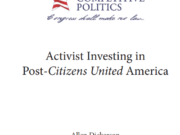Last Tuesday, Senator Jon Tester (D-MT) introduced the latest proposed Constitutional amendment to overturn the Supreme Court’s 2010 ruling in Citizens United. According to Sen. Tester, the amendment seeks to ensure that “real people and their ideas – not corporations and their money – …decide our elections.” As misguided as this understanding of Citizens United (and how elections work generally) is, it’s not even the most troubling aspect of this proposal.
For Sen. Tester and his fellow-travelers, the whole problem is that “corporations are not ‘people,’” and corporations’ rights are in direct conflict with the rights of natural persons. Consequently, Mr. Tester’s amendment (S. J. Res. 18) declares:
We the people who ordain and establish this Constitution intend the rights protected by this Constitution to be the rights of natural persons.
And:
The words people, person, or citizen as used in this Constitution do not include corporations, limited liability companies or other corporate entities…and such corporate entities are subject to such regulation as the people, through their elected State and Federal representatives, deem reasonable…
In other words, unlike other amendments, which give Congress and the states explicit power to regulate campaign finance (dangerous as that may be), Mr. Tester’s proposed amendment would strip corporate entities of all constitutional protection whatsoever. That means Koch Industries and Crossroads GPS couldn’t invoke the First Amendment, but it also means The New York Times and the ACLU couldn’t either. Restricting application of the Bill of Rights to “natural persons” would take the First Amendment’s guarantee of free religious exercise from churches. It would mean the Fifth Amendment no longer applies to charities and companies, giving the federal government carte blanche to regulate them and seize their property without compensation or due process.
Of course, the government wouldn’t actually take these extreme actions (at least not all at once), but they could, and that is enough to render the Bill of Rights obsolete. Senator Tester’s absolute warfare on free political speech would demolish the Constitution’s entire structure of individual liberties and checks on government power – all to prevent Super PACs from running political ads he doesn’t like.
Corporate entities are recognized as persons under certain areas of the law because they are created by natural persons for the benefit of natural persons. Corporate rights are inextricable from individual rights. Far from being in conflict, they are actually so co-dependent that you can’t destroy one without eviscerating the other.
Laura W. Murphy, Director of the ACLU’s Washington Legislative Office, makes this point in her response to a comparatively modest amendment proposal:
…if there is one thing we absolutely should not be doing, it’s tinkering with our founding document to prevent groups like the ACLU (or even billionaires like Sheldon Adelson) from speaking freely about the central issues in our democracy. Doing so will fatally undermine the First Amendment, diminish the deterrent factor of a durable Constitution and give comfort to those who would use the amendment process to limit basic civil liberties and rights. It will literally “break” the Constitution.
Although the outcome of the 2012 elections illustrated the inherently limited influence of independent spending, misguided attempts to reverse Citizens United and restrict this spending have only multiplied and diversified. So-called “reformers” seem to be enjoying their First Amendment right to promote radical and catastrophic changes to the Republic. Ironically, it’s up to everyone else to ensure they keep this right in spite of themselves.














